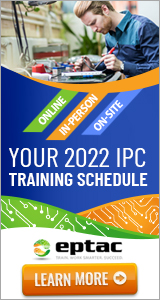The U.S. Environmental Protection Agency’s (EPA) reporting requirements for manufacturing byproducts sent for recycling are “burdensome, unnecessary, and actually discourage recycling,” an industry expert told Congress today.
Speaking on behalf of more than 2,000 U.S. electronics manufacturers who are members of IPC — Association Connecting Electronics Industries®, Dr. Brent Grazman said IPC members are strong advocates of scientifically based regulations that improve environmental conditions, protect human health and stimulate the economy. On those grounds, he said, the industry has concerns about the way EPA has implemented Section 8 of the Toxic Substances Control Act (TSCA).
Grazman is Vice President, Quality, of St. Louis-based Viasystems, and he spoke before the House Energy and Commerce Committee’s Subcommittee on Environment and the Economy, which is considering an overhaul of TSCA.
“It is critical that Congress reform TSCA in a way that directs the EPA to prioritize its regulation of chemicals,” Grazman said. “Substances that exhibit the greatest hazards, and those that pose the greatest exposure to consumers, should be given priority for review, testing and, as necessary, regulation.”
But the EPA’s treatment of manufacturing byproducts does not reflect sound priorities, he said. Under the EPA’s interpretation of TSCA, byproducts are considered to be new chemicals if sent for recycling, creating an enormous compliance burden for substances that are already regulated under other statutes.
“As a nation, we recognize ‘reduce, reuse and recycle’ as goals. But the EPA is undercutting those goals with regulations that discourage the beneficial recycling and reuse of valuable metals in manufacturing byproducts,” Grazman said. “We encourage Congress to directly exempt all byproducts from Section 8, including those that are sent for recycling.”
A copy of Dr. Grazman’s testimony is available at www.ipc.org/EHS-testimony, and a photograph of him testifying is available upon request.
IPC (www.IPC.org) is a global industry association based in Bannockburn, Ill., dedicated to the competitive excellence and financial success of its 3,400 member companies which represent all facets of the electronics industry, including design, printed board manufacturing, electronics assembly and test. As a member-driven organization and leading source for industry standards, training, market research and public policy advocacy, IPC supports programs to meet the needs of an estimated $2 trillion global electronics industry. IPC maintains additional offices in Taos, N.M.; Washington, D.C..; Stockholm, Sweden; Moscow, Russia; Bangalore, India; Bangkok, Thailand; and Shanghai, Shenzhen, Suzhou, Chengdu and Beijing, China.
 »
»




